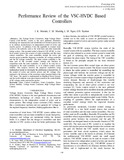Performance review of the VSC-HVDC based controllers

View/
Date
2016Author
Muriuki, J. K.
Muriithi, Christopher M.
Ngoo, L. M.
Nyakoe, G.N.
Metadata
Show full item recordAbstract
The Voltage Source Converters, High Voltage Direct Current (VSC-HVDC) system is the most preferred alternative technology for transmission and distribution of electrical power due to its intrinsic distinctiveness in independent control of active and reactive power. In addition, it has the capability to connect weak system to the networks such as the wind farm and other renewable
Energy sources. The cascaded control scheme in VSC-HVDC is a two level control system that consists of outer controllers and the inner current controllers. The outer controllers include the active and reactive power controller, frequency controller, AC-voltage controller
And the DC-voltage controller. The inner current controller is the inner part of the cascaded control strategy and function in conjunction with the outer controllers. It needs to be very fast as
Compared to the outer controllers so as to achieve control system stability. This analysis involves the proposed controllers using mathematical model to investigate the performance characteristics in the control of active and reactive power, and DC voltage. Also analyzed is the behavior of the converters under transient fault at the VSC buses. The model is implemented in Dig Silent Power Factory and the results indicate some good improvement in the controllability of DC voltage, active and reactive power.
—
